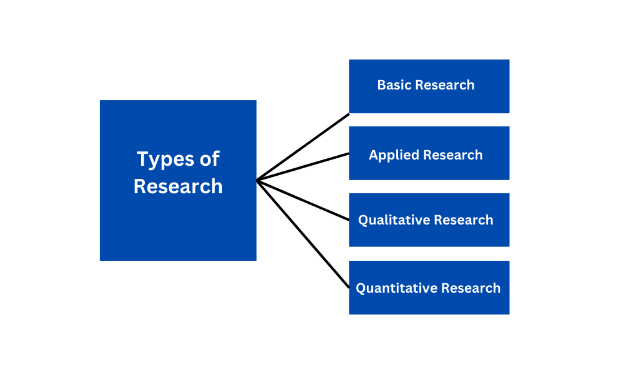Types of Research:
Basic Research: Basic research is focused on advancing knowledge and understanding without any immediate practical application. It is often carried out in academic settings, and aims to generate new theories and concepts.
Applied Research: Applied research is focused on solving practical problems or addressing specific issues. It often involves the use of existing knowledge to develop new technologies, products, or services.
Quantitative Research: Quantitative research is based on the collection and analysis of numerical data using statistical methods. It is often used to test hypotheses or explore relationships between variables.
Qualitative method is used to understand people’s beliefs, experiences, attitudes, behavior, and interactions. It generates non-numerical data. The integration of qualitative research into intervention studies is a research strategy that is gaining increased attention across disciplines.

Qualities of Good Research:
Validity: Good research should be valid, meaning that it accurately measures what it intends to measure.
Reliability: Good research should be reliable, meaning that it produces consistent results over time and across different contexts.
Generalizability: Good research should be generalizable, meaning that the findings can be applied to other populations or contexts.
Objectivity: Good research should be objective, meaning that it is free from bias and personal opinions.
Transparency: Good research should be transparent, meaning that the methods, data, and analysis should be clearly and openly documented.
Ethical: Good research should be ethical, meaning that it is conducted in accordance with ethical principles and guidelines to ensure the safety and well-being of participants and other stakeholders.
Research Application in a functional area of Business
Research plays an important role in informing decision-making and problem-solving in various functional areas of business. One example of a functional area where research is commonly applied is marketing.
Marketing research involves the collection and analysis of data related to customers, competitors, and the marketplace in order to inform marketing strategies and tactics. Marketing research can help businesses to better understand their target customers, identify market trends, evaluate the effectiveness of marketing campaigns, and make data-driven decisions about product development, pricing, and distribution.
There are several ways in which marketing research can be applied in business:
Market Segmentation: Marketing research can help businesses to identify different segments within a target market based on characteristics such as demographics, psychographics, and behavior. This can help businesses to develop more targeted marketing campaigns that are tailored to the specific needs and preferences of each segment.
Product Development: Marketing research can be used to gather feedback from customers about existing products or to identify unmet needs that can be addressed through new product development. This can help businesses to create products that better meet customer needs and preferences.
Pricing Strategy: Marketing research can be used to evaluate different pricing strategies and to determine the optimal price for a product or service based on customer perceptions, competitive pricing, and market conditions.
Brand Perception: Marketing research can be used to evaluate customer perceptions of a brand, including factors such as brand awareness, brand loyalty, and brand reputation. This can help businesses to identify opportunities to strengthen their brand and improve customer loyalty.
Advertising Effectiveness: Marketing research can be used to evaluate the effectiveness of advertising campaigns, including factors such as message appeal, creative execution, and media placement. This can help businesses to optimize their advertising efforts and achieve better results.
Overall, research plays a critical role in informing decision-making and driving business success in the functional area of marketing. By applying research methods and techniques to gather and analyze data, businesses can gain valuable insights into customer needs and preferences, market trends, and competitive dynamics, and use this information to develop more effective marketing strategies and tactics.